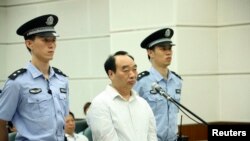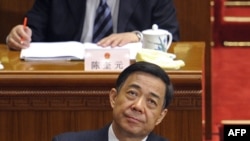China’s high-profile anti-corruption push continues to make headlines, with a regular stream of officials brought down for abusing power.
One of the latest targets in the “fanfu” campaign--anti-corruption in Chinese -- is Wang Suyi, head of the United Front Work Department in the northern region of Inner Mongolia.
Wang's case follows the script of many other fallen Chinese officials whose crimes seem to be entangled in a web of greed and lust.
The mistress factor
The journalist who broke the news this week said a number of mistresses joined together and reported their lovers' corruption to the authorities.
The women said Wang had illegally amassed at least $16 million, kept a number of mistresses including a college student and a journalist, had dozens of properties, and embezzled funds. He also allegedly gave jobs to nearly 30 relatives.
As a result, Wang was fired from his posts for a “serious breach of party discipline,” a move that opens up the possibility for legal action.
Fu Hualing, a legal scholar at the University of Hong Kong, said that mistresses have become part of China's anti-graft efforts.
“Behind almost every corrupt official there is or there was a mistress or multiple mistresses,” he said, “The investigators know exactly what is happening, so the best way to investigate anyone they want to investigate is first locate the mistress.”
Angry mistresses often play an important role in uncovering officials' abuses, and their stories frequently drive publicity of the cases on the Internet.
In late June, Lei Zhengfu, a former party official in the southern city of Chongqing, was given a 13 year prison sentence for corruption. According to the court, he had taken bribes nearly a half million dollars, a relatively small amount when compared to other cases of corruption in China.
Yet, his case drew especially broad notice because of his videotaped sexual encounters with a woman that were leaked on Chinese social media.
Despite the notoriety of such cases, Roderick MacFarquhar, a China specialist at Harvard University, said authorities have still not convinced the public that the campaign is addressing the core problem.
“Their reaction to the current campaign will continue to be cynicism that it doesn't expose really senior leaders,” he said.
Striking the “Big Tiger”
Some high ranking officials have been among the flurry of new cases. Yet in most cases the legal process has been slow, suggesting that authorities have not been able to agree on the charges they should face.
A prime example is Bo Xilai, once a promising young politician in charge of the city of Chongqing, whose political ascent was cut short after details emerged of his wife's involvement in the murder of a British business partner.
After seven months of investigations, the Party's internal anti-corruption agency cleared the way for legal prosecution last September, but so far no trial date has not been set.
“He is the big elephant in the room,” said Fu Hualing, “The Chinese government is very good in the beginning when they investigate someone, but then the cases would disappear in the system.”
Liu Tienan is another high profile case whose mistresses accused him of taking bribes. The senior economic policy maker is one of the highest ranking officials charged with corruption since Xi Jinping took power in March.
Liu, former deputy director of the National Development and Reform Commission, was dismissed from the party in May and is now under investigation. No date has been set for his trial.
Other analysts are more optimistic about the president’s anti-corruption bid.
Ren Jianming is director of the anti-corruption and governance research center at Beijing's Tsinghua University.
“After the last Party Congress there was a lot of expectation that the new leadership could do something meaningful on anti-corruption - like Xi Jinping said - that they could fight the big tiger [of corruption],” he said, “these recent cases do strike some cords.”
But Ren says that the impact of this campaign might only be short term. In the long run, history has showed that only deep reforms and independent inspection of party members can effectively curb corruption, he said. “It is very unlikely that we only rely on cadres disciplining themselves, or on monitoring done within the government itself.”
Road to promotion
In many corruption cases, the prosecution uncovers evidence of abuses that officials allegedly perpetrated while advancing their political careers.
That has been the case with Liu Zhijun, the former Minister of Railways.
Based on the evidence reported by China's news agencies, Liu had illegally benefited from his post from 1986 to 2011, accepting some $10 million in bribes.
“You are corrupt and you keep getting promoted,” said He Bing, Assistant Dean of the Law School at the China Political Science and Law University.
Liu, along with other corrupt senior officials currently under investigation, could face the death penalty or life in jail if found guilty.
He Bing said that the fact that senior officials are also being targeted might alert other, lower-ranked cadres.
“They might restrain themselves somewhat,” he said, “But the bigger phenomenon has clearly not been managed yet.”
One of the latest targets in the “fanfu” campaign--anti-corruption in Chinese -- is Wang Suyi, head of the United Front Work Department in the northern region of Inner Mongolia.
Wang's case follows the script of many other fallen Chinese officials whose crimes seem to be entangled in a web of greed and lust.
The mistress factor
The journalist who broke the news this week said a number of mistresses joined together and reported their lovers' corruption to the authorities.
The women said Wang had illegally amassed at least $16 million, kept a number of mistresses including a college student and a journalist, had dozens of properties, and embezzled funds. He also allegedly gave jobs to nearly 30 relatives.
As a result, Wang was fired from his posts for a “serious breach of party discipline,” a move that opens up the possibility for legal action.
Fu Hualing, a legal scholar at the University of Hong Kong, said that mistresses have become part of China's anti-graft efforts.
“Behind almost every corrupt official there is or there was a mistress or multiple mistresses,” he said, “The investigators know exactly what is happening, so the best way to investigate anyone they want to investigate is first locate the mistress.”
Angry mistresses often play an important role in uncovering officials' abuses, and their stories frequently drive publicity of the cases on the Internet.
In late June, Lei Zhengfu, a former party official in the southern city of Chongqing, was given a 13 year prison sentence for corruption. According to the court, he had taken bribes nearly a half million dollars, a relatively small amount when compared to other cases of corruption in China.
Yet, his case drew especially broad notice because of his videotaped sexual encounters with a woman that were leaked on Chinese social media.
Despite the notoriety of such cases, Roderick MacFarquhar, a China specialist at Harvard University, said authorities have still not convinced the public that the campaign is addressing the core problem.
“Their reaction to the current campaign will continue to be cynicism that it doesn't expose really senior leaders,” he said.
Striking the “Big Tiger”
Some high ranking officials have been among the flurry of new cases. Yet in most cases the legal process has been slow, suggesting that authorities have not been able to agree on the charges they should face.
A prime example is Bo Xilai, once a promising young politician in charge of the city of Chongqing, whose political ascent was cut short after details emerged of his wife's involvement in the murder of a British business partner.
After seven months of investigations, the Party's internal anti-corruption agency cleared the way for legal prosecution last September, but so far no trial date has not been set.
“He is the big elephant in the room,” said Fu Hualing, “The Chinese government is very good in the beginning when they investigate someone, but then the cases would disappear in the system.”
Liu Tienan is another high profile case whose mistresses accused him of taking bribes. The senior economic policy maker is one of the highest ranking officials charged with corruption since Xi Jinping took power in March.
Liu, former deputy director of the National Development and Reform Commission, was dismissed from the party in May and is now under investigation. No date has been set for his trial.
Other analysts are more optimistic about the president’s anti-corruption bid.
Ren Jianming is director of the anti-corruption and governance research center at Beijing's Tsinghua University.
“After the last Party Congress there was a lot of expectation that the new leadership could do something meaningful on anti-corruption - like Xi Jinping said - that they could fight the big tiger [of corruption],” he said, “these recent cases do strike some cords.”
But Ren says that the impact of this campaign might only be short term. In the long run, history has showed that only deep reforms and independent inspection of party members can effectively curb corruption, he said. “It is very unlikely that we only rely on cadres disciplining themselves, or on monitoring done within the government itself.”
Road to promotion
In many corruption cases, the prosecution uncovers evidence of abuses that officials allegedly perpetrated while advancing their political careers.
That has been the case with Liu Zhijun, the former Minister of Railways.
Based on the evidence reported by China's news agencies, Liu had illegally benefited from his post from 1986 to 2011, accepting some $10 million in bribes.
“You are corrupt and you keep getting promoted,” said He Bing, Assistant Dean of the Law School at the China Political Science and Law University.
Liu, along with other corrupt senior officials currently under investigation, could face the death penalty or life in jail if found guilty.
He Bing said that the fact that senior officials are also being targeted might alert other, lower-ranked cadres.
“They might restrain themselves somewhat,” he said, “But the bigger phenomenon has clearly not been managed yet.”






